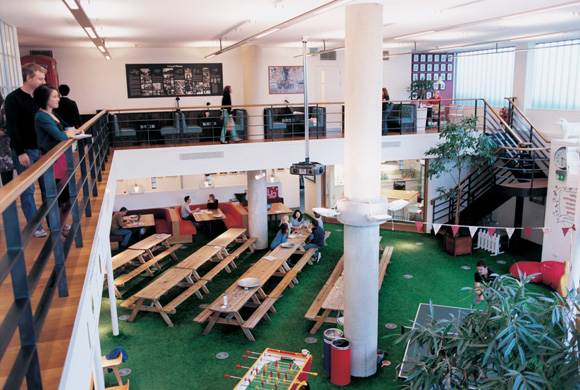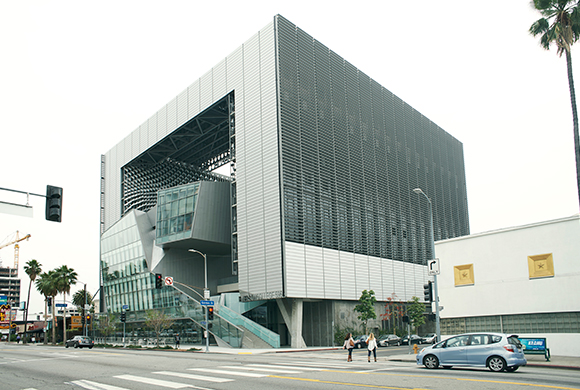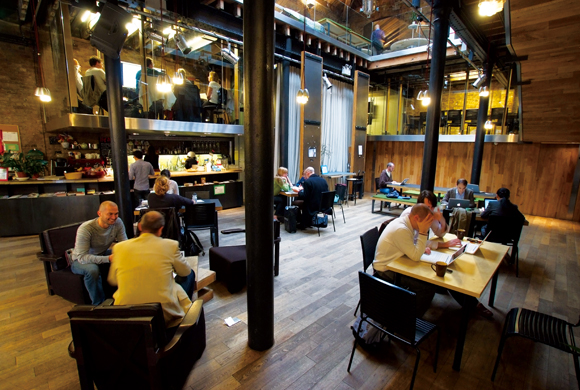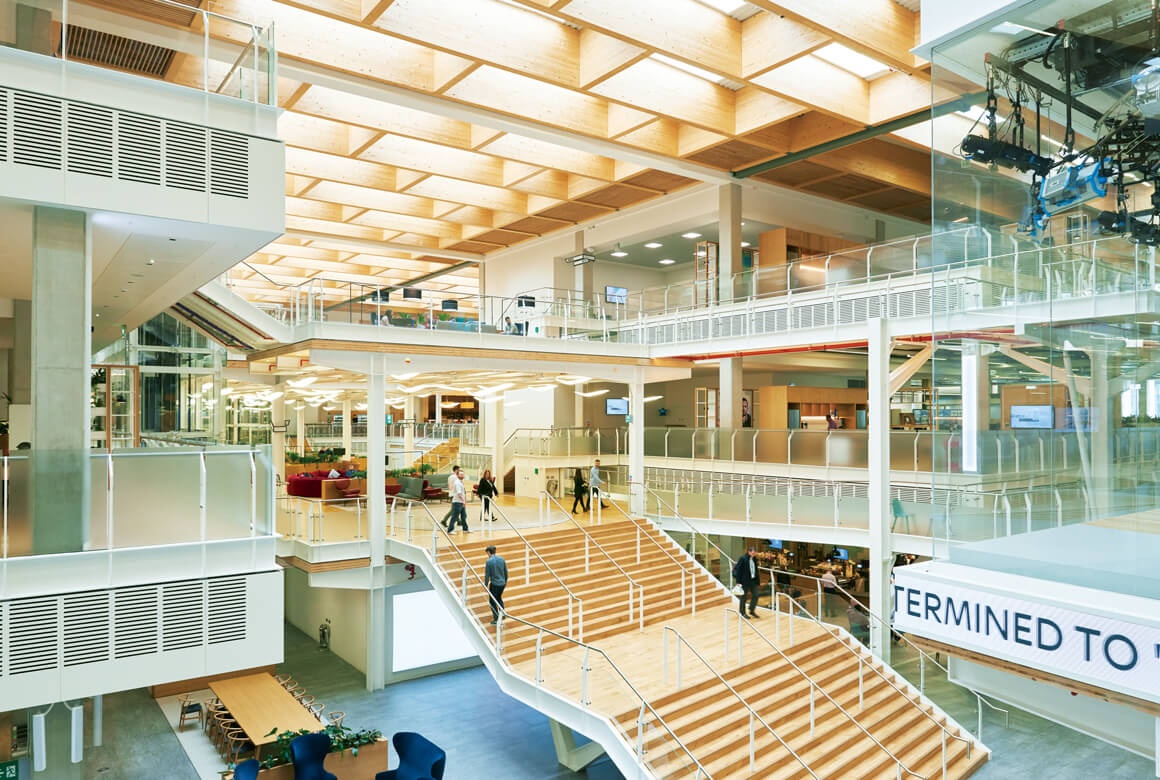Workplace
Jan. 12, 2016
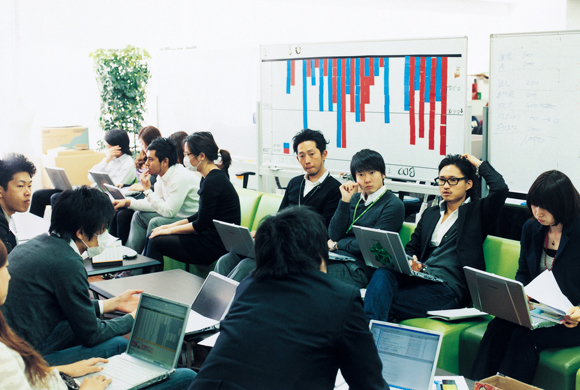
Investing in businesses and people who have eliminated habit and apathy
Internet portal company's Ameba business rapidly expands
[Cyber Agent] Shibuya Tokyo, Japan
Apart from one section of its headquarters located in Shibuya, Tokyo’s Shibuya MyCity building, the offices of Cyber Agent are spread among many multi-tenant buildings in this popular part of the city. An average of 50 new employees join every month; with outsourcing this total rises to some 100, showing this is a growing company.
Media- related positions are a major part of the new business for the company, which has inten- tionally chosen to work in small- and mid- size buildings. When you enter into a large space, there is the expansive sensation of having plenty of elbowroom.
But, they say, for a venture company is not necessarily a plus in working here. In reality, there are many employees who feel a sudden sense of stimulation as they enter an old, multi-tenant building. Space changes the way people feel, and here they are moving from a thinking that says the space decides how the organization will be structured, to a thinking that instead matches the business model and phase of business development to the building being selected and office layout. Then the natural changes that occur can be a source of motivation for employees.
The interior design is largely simple and functional. Each employee is given one wedge-shaped table which each team can then arrange as they like—cabinets or wheeled filing units are not allowed. Personal baggage can only be placed into a locker.
The intention is to not have an over-built office. This is because within one year, there will be between 50 to 60 moves or layout changes. In the past, a lot of money was spent in doing things in a way that an em- ployee liked, but too often just before the work was completed the individual would move.
As market conditions change and the business goes through different growth phases, the number of people will increase or decrease. They must keep in mind that the organization is constantly changing, so it’s very important that the company is able to act based on the requirements of the moment.
It’s tough with people coming and going, but at the same time, to make it easier for communication every new employee gets a “welcome balloon,” a traditional congratu- latory paper ball, mounted at their desk. It’s a culture in which people can post sheets or stickers as they like, with walls, corridors and elevator halls especially covered, something that gives a sense of the vitality of the various departments.
 Cyber Agent
Cyber Agent
Founded:1998
2011 sales:¥120 billion
2011 net profits:¥14 billion Employees: 1,981 (as of May, 2012)
http://www.cyberagent.co.jp/
 All employees receive a booklet called “Maxims,” laying out the company’ s guiding principles.
All employees receive a booklet called “Maxims,” laying out the company’ s guiding principles.
 A kusudama (celebratory paper ball) in a corner of the office. These are used in award ceremonies.
A kusudama (celebratory paper ball) in a corner of the office. These are used in award ceremonies.
“Elimination of apathy” is management’s goal. If we assume that a human is essentially an animal that easily loses interest in things, then trying to fight habit in the workplace is impossible. There are lots of things that can be done—change of duties, change of the organization, change of superior, change of work partners—and working to eliminate apathy among employees is a major concern for the company.
To understand the feelings of each em- ployee, eight executives will each week two or three times invite people to join them for a lunch or a drink. Doing some simple calcula- tions, if there are two lunches and two evenings out that means that five people will be invited, so all together 20 people will be in contact with the managers each week.
If that continues over a month, then there will be meetings with 100 people. Multiply that by the eight managers, and the total is 800. Over a year, that means they can reach 10,000 people—a number far greater than the total employee roster.
Along with listening to the employees, the company has a second line of action in efforts such as Jigyotsuku (“Building the Company”), an open appeal to employees for business ideas; a management public pre- sentation called Ashita Kaigi (literally “Tomor- row Meeting”); and the fact that an employee who remains in one business area for more than one year is eligible for a move to a different post.
Management also makes job rotations, proposing new duties to employ- ees. These are the foundations for a guiding principle in which expanding business relies on excellent human talent. It’s part of an active personal system seeking talented people, and which even headhunts within the company for those with high potential.
One striking example is the “graduate president” concept. If an outstanding person joins the company as an employee straight out of college, they are selected as the manager of a subsidiary company. If they receive this management experience in their 20s, and they gain leadership capabilities, then whether they succeed or fail is not as important as the opportunity for growth.
There are currently 34 “graduate presidents” and “graduate executives.” This year, four potential employees who had developed an iPhone camera app called My365—and which was downloaded one million times in five months—were set as the leaders of a new subsidiary company established with capitalization of ¥50 million.
Global development is a major challenge for Cyber Agent, so the decision was made to send some of their “ace employees” overseas. The international market is far more difficult than the domestic. One such ace is the vice president of the company’s American subsidiary, who, when he was chosen for the task seven years ago, was a new employee who had just graduated from college. If one has the ability, age or experience doesn’t mater—the opportunity is there. That makes for a company that, regardless of how large it grows, will always have an entrepreneurial spirit.
From WORKSIGHT 02(June, 2012)
 “The company is about to hold the 16th installation of our Jigyotsuku event aimed at gathering new business ideas from employees,” says Tetsuhito Soyama. “In the first Jigyotsuku, 14 entries were received, but then we only received a total of 100 entries up to the 10th event. From the 11th Jigyotsuku, the people in charge also went to the company’s sales department to explain its benefits, including that everyone submitting ideas would get feedback from the eight directors of the company. Word also traveled within the company that managers would be headhunting people from among those submitting ideas—and 1,200 ideas were submitted. At the same time, the sixth Ashita Kaigi is being held. The meaning is ‘a meeting to think about tomorrow,’ and is a presentation by eight executives. This involves the scouting of the employees by managers to try and find superior individuals, and to better understand the human resources within the company. These are two motivational activities that we are currently undertaking.”
“The company is about to hold the 16th installation of our Jigyotsuku event aimed at gathering new business ideas from employees,” says Tetsuhito Soyama. “In the first Jigyotsuku, 14 entries were received, but then we only received a total of 100 entries up to the 10th event. From the 11th Jigyotsuku, the people in charge also went to the company’s sales department to explain its benefits, including that everyone submitting ideas would get feedback from the eight directors of the company. Word also traveled within the company that managers would be headhunting people from among those submitting ideas—and 1,200 ideas were submitted. At the same time, the sixth Ashita Kaigi is being held. The meaning is ‘a meeting to think about tomorrow,’ and is a presentation by eight executives. This involves the scouting of the employees by managers to try and find superior individuals, and to better understand the human resources within the company. These are two motivational activities that we are currently undertaking.”






